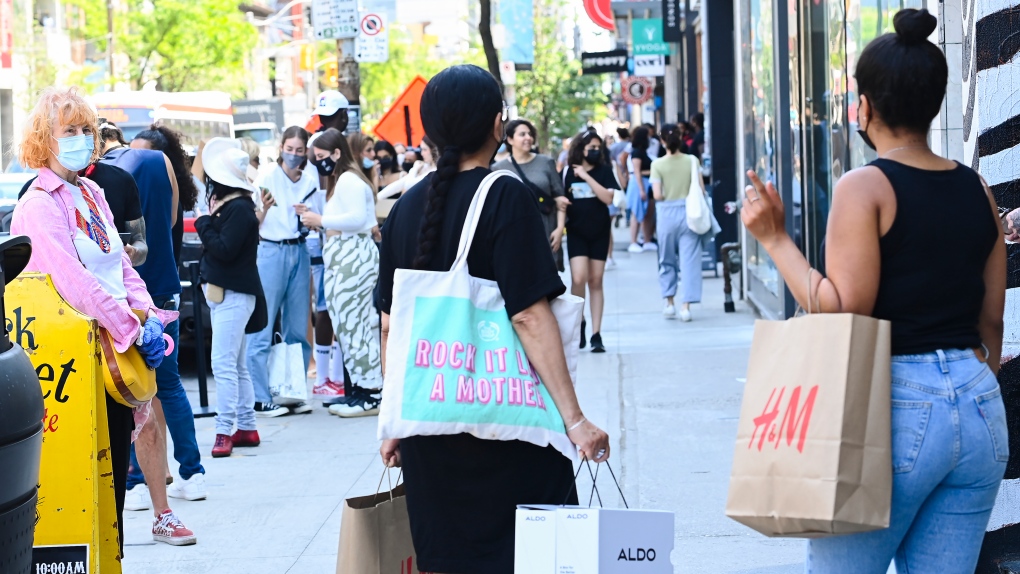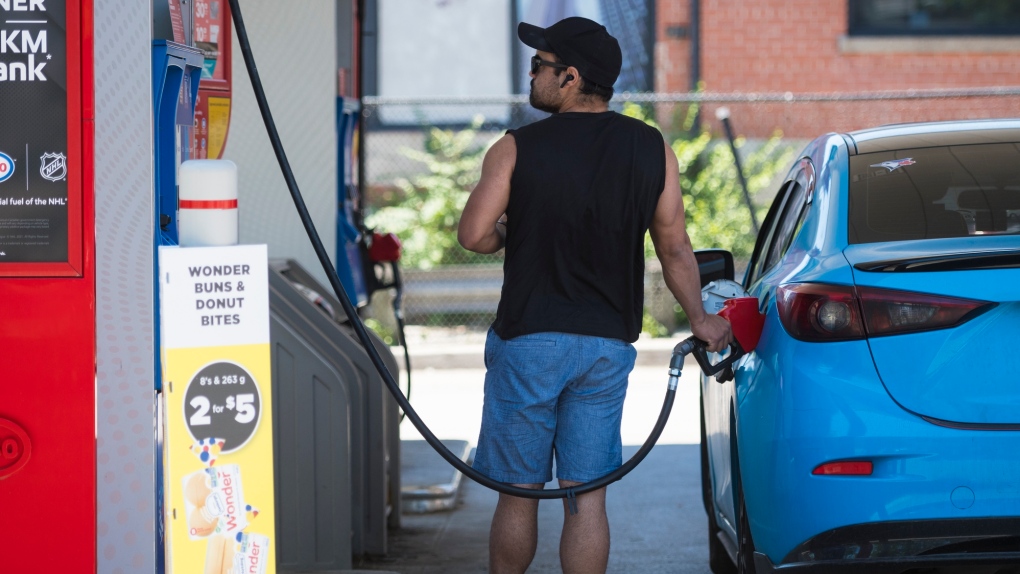Is Canada heading into a recession? This is what you need to know
As gas prices and food costs continue to escalate and another interest rate hike is expected next month, many Canadians are wondering if a recession is coming and how to prepare for a possible economic downturn.
Sixty-eight per cent of Canadians believe the country is heading towards a recession, while 17 per cent believe it has already arrived, according to a new survey from Yahoo Canada/Maru Public Opinion released earlier this week.
However, 15 per cent of Canadians believe the concern about a recession happening now or later is exaggerated.
But if a recession were to occur, what does that mean for Canadians and how should they prepare for it?
WHAT IS A RECESSION?
A recession can simply be defined as a sustained decline in economic activity for at least six months. This could result from a decline in consumer spending, which in turn could cause sales to drop, businesses to cut costs and ultimately more layoffs.
 People shop and wait in long lines to enter stores along Queen Street West during the COVID-19 pandemic in downtown Toronto on Friday, June 11, 2021. THE CANADIAN PRESS/Nathan Denette
People shop and wait in long lines to enter stores along Queen Street West during the COVID-19 pandemic in downtown Toronto on Friday, June 11, 2021. THE CANADIAN PRESS/Nathan Denette
“I think the simple rule of thumb is two straight quarters of economic contraction and production of goods and services,” Derek Burleton, deputy chief economist for TD Bank Group, told CP24.
“So we tend to refer to gross domestic product (GDP) as being that overall measure of activity. If we have two straight quarters of decline that passes the simple litmus test of recession.”
The country’s last recession was in 2020 during the height of the COVID-19 pandemic.
IS THERE A RECESSION COMING?
With inflation at a nearly 40-year high and the Bank of Canada expected to raise its key interest rate next month, these factors could kick start another recession.
Statistics Canada said its consumer price index in May rose 7.7 per cent compared with a year ago, the fastest pace since January 1983.
“It's not an oil price issue or food price issue, it’s widespread inflation across the economy, that tells us and that tells policymakers the economy has just been running too hot for too long. We have an inflation issue rooted in the psychology of Canadians and among businesses, and it's going to have to be dealt with,” BMO Senior Economist Robert Kavcic told CP24.
 A commuter pumps gas into their vehicle at a Esso gas station in Toronto on Tuesday, June 15, 2021. THE CANADIAN PRESS/ Tijana Martin
A commuter pumps gas into their vehicle at a Esso gas station in Toronto on Tuesday, June 15, 2021. THE CANADIAN PRESS/ Tijana Martin
The Bank of Canada has said that Russia's invasion of Ukraine, COVID-19 lockdowns in China and backlogged supply chains are fuelling “uncertainty” and higher prices for energy and food, prompting a need to increase interest rates to control inflation.
The central bank has hiked its key interest rate three times so far this year to bring it to 1.5 per cent.
But many economists, including Burleton and Kavcic, expect the central bank to raise its key rate once again by at least three quarters of a point next month to mirror the U.S. Federal Reserve’s recent interest rate hike.
Burleton said this hike could dampen consumer spending, which in turn could eventually ignite a recession.
“I mean as rates go up, the bigger the chance that economic activity will weaken next year but the Bank of Canada feels from a longer-term perspective if they can bring inflation down to their target that will serve Canadians the best over the medium to longer run. So unfortunately, it's going to come at the cost of some output foregone over the next four to six quarters,” Burleton said.
BMO is not forecasting a recession but Kavcic said if “sticky price pressures” continue and the central bank has to continue raising rates then it will be a “big pill for the economy to swallow.”
“Our view on this is that we're going to see economic growth really stall out through the latter stages of this year and the first half or so of next year.”
TD Bank is also not predicting a recession but said in its quarterly economic forecast that “there is a very thin margin for error if another shock hits economies.”
Burleton noted that Canadians are currently experiencing an unusual recovery after the recession in 2020 and that nothing “is a given at this stage.”
“The economy has shown me real resilience. We saw it with the April retail spending numbers. Our own high-frequency data internally…still shows resilience through May. So the economy is holding up in the first half. I guess the question is, to what extent it softens going forward.”
Burleton added that although risks are rising, he thinks a recession does not seem imminent.
HOW TO PREPARE FOR A RECESSION
In anticipation of a possible recession, 56 per cent of the respondents from Maru Public Opinion’s survey said they have set stricter priorities and reduced their spending in the past month.
Eighty-six per cent said they spent more on food this month compared to last month, while 82 per cent also said they spent more on gas.
 A woman wearing a mask is seen grocery shopping in this file photo. (Anna Shvets/Pexels)
A woman wearing a mask is seen grocery shopping in this file photo. (Anna Shvets/Pexels)
Burleton said it’s a smart move to put away additional savings in preparation of a potential recession.
“It's probably not a bad thing to kind of start thinking about ways to protect yourself as a household in the event (of a recession). I think the good news is that based on aggregate data of the Canadian economy, a lot of households are holding on to additional deposits and savings…and we're counting on some of that cushion to help defend against deeper outcomes in the economy going forward.”
Sixty-three per cent of survey respondents said food is the biggest expense that they have cut down on in the past month, followed by entertainment and clothing and footwear.
The Yahoo Canada/Maru Public Opinion survey was conducted between June 17 and 19 among a random selection of 1,515 Canadian adults who are Maru Voice Canada panelists. The survey has an estimated margin of error of +/- 2.5 per cent, 19 times out of 20.
With files from The Canadian Press
CTVNews.ca Top Stories

WATCH LIVE From essential goods to common stocking stuffers, Trudeau offering Canadians temporary tax relief
Consumers will receive a temporary tax break on essential items and common stocking stuffers heading into the holiday season, Prime Minister Justin Trudeau announced Thursday, alongside a spring $250 rebate for 18.7 million Canadians.
Mother charged after infant dies in midtown Toronto: police
The mother of an infant who died after being found at an apartment building in midtown Toronto on Wednesday has been charged with failing to provide the necessaries of life.
2 arrested during Greenpeace protest outside Stornoway residence in Ottawa
Two people have been arrested following a protest outside Stornoway, the official residence of Canada's leader of the Opposition.
Arrest warrant issued for suspect charged in Toronto airport gold heist
Peel police say a bench warrant has been issued for the arrest of one of the suspects charged in connection with the gold heist at Pearson International Airport last year.
Son of Norway crown princess detained for one week in rape probe
The son of Norway's crown princess will be jailed for up to one week while police investigate accusations of rape made against him, a judge ruled on Wednesday.
Watch Dramatic video shows officers save driver from burning truck after brakes fail
Stunning video shows officers in Columbus, Ohio jumping into action to save a driver from his burning pickup truck.
Jussie Smollett's conviction in 2019 attack on himself is overturned
The Illinois Supreme Court on Thursday overturned actor Jussie Smollett's conviction on charges that he staged a racist and homophobic attack against himself in downtown Chicago in 2019 and lied to police.
Canadian painting found in barn, purchased for US$50 sells for hundreds of thousands at auction
An Emily Carr painting that sold for US$50 at an estate sale has fetched C$290,000 at a Toronto auction.
1991-2024 Sea Bears player Chad Posthumus dies at 33
Sea Bears centre Chad Posthumus has died at age 33.



























